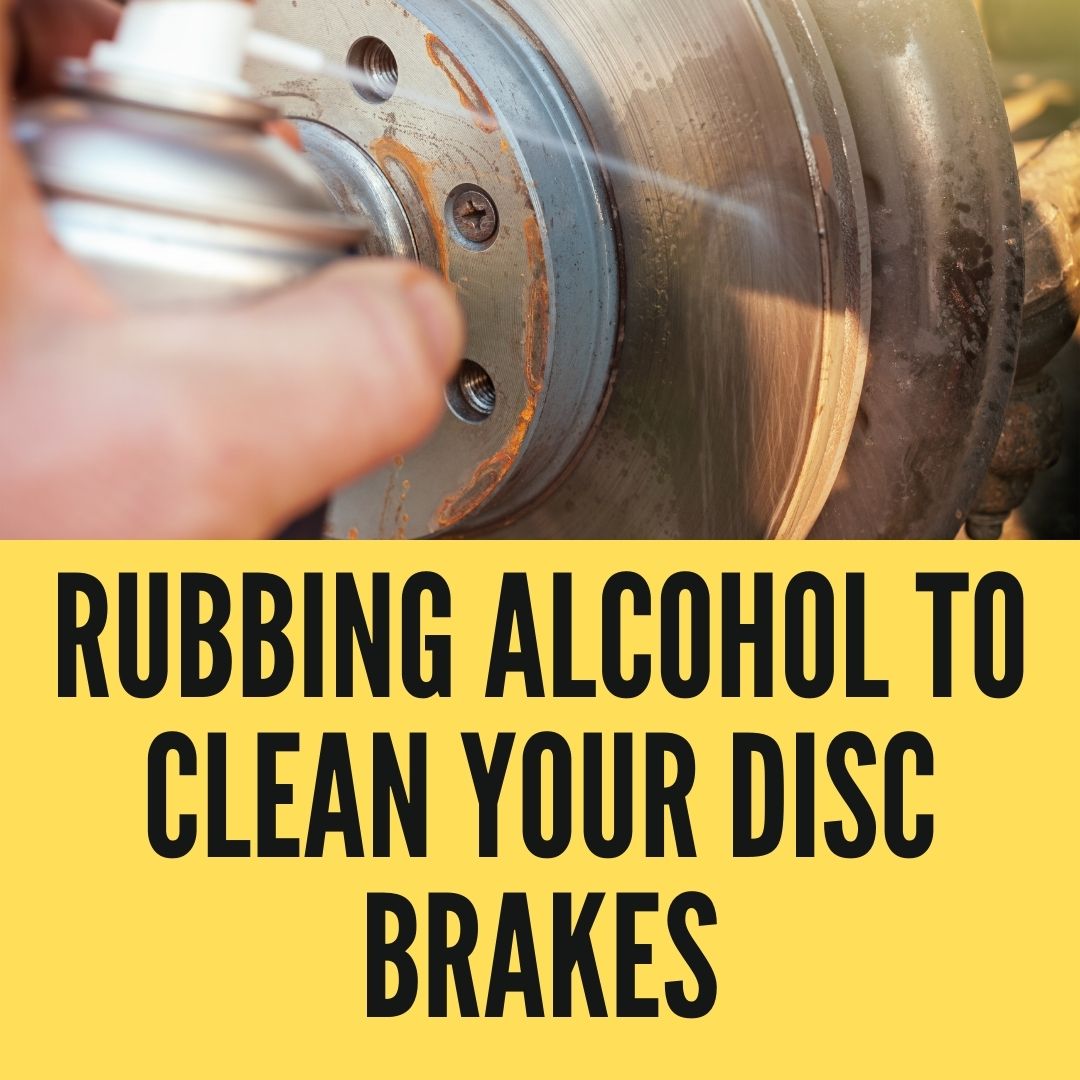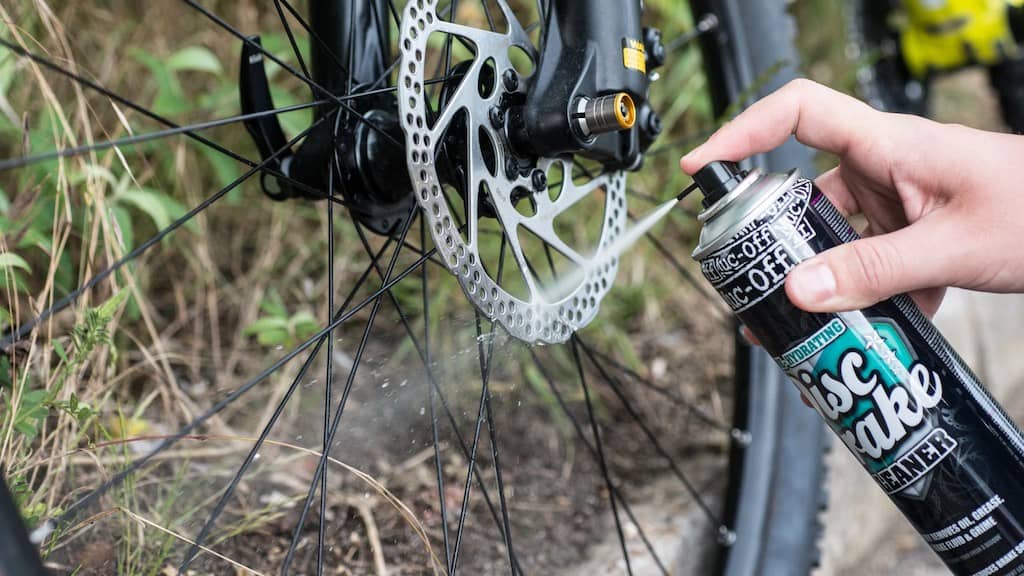
You know just how annoying it can be when your disc brakes start to act up. They start to make an awful squeaking noise, often feel wobbly and unsafe, and you may also notice significantly less brake power (which can be very dangerous).
So can rubbing alcohol be used on disc brakes? Disc brakes can be cleaned with rubbing alcohol. Rubbing alcohol is actually the cleaner of choice used by professional cyclists and mechanics all around the world. Unlike other “brake cleaners” on the market, rubbing alcohol is able to quickly break down even the toughest oil and grime sticking to the discs.

Want to learn the best way to clean your disc brakes with alcohol? We’re about to show you everything you need to know. In today’s article, we’re going to be taking a look at one of the most popular methods used by mechanics to clean their brakes- rubbing alcohol.
Cleaning Your Bike’s Disc Brakes With Rubbing Alcohol
Before you jump the gun and replace your expensive disc brakes with brand new ones, you should try cleaning them. Nine times out of ten, the reason your brakes are acting up is that they need cleaning.
Let’s face it- conditions aren’t always perfect when you’re biking. Your wheels will run through puddles of water, oil, and who knows what else. You’ll ride through sand, dust, dirt, and mud every day (unless you’re riding indoors).
As your wheels run through these contaminants throughout the day, they start to build up and harden. As you can imagine, this can put a real wrench in the works, causing your tires to wobble and your brakes to squeak.
Bicycle disc brakes are fine-tuned by the manufacturers; while they’re built to withstand a bit of dirt and mud, they won’t function well in the long term if you don’t clean them.
Rubbing alcohol is hands-down the best way to clean your disc brakes. Unlike other “brake cleaners” on the market, alcohol is able to quickly break down even the toughest oil and grime sticking to the discs.
Since it quickly evaporates, it won’t leave behind any unwanted oil or residue that could hinder the functionality of the disc.
If you’re a curious individual, then you’re probably wondering, “How does alcohol dissolve oil and grime so easily?”
The answer has to do with a chemistry concept known as polarity. Ever heard of it before? Don’t worry, I’ll do my best to make it more understandable than your high school chemistry teacher did!
Polarity refers to the charge of an atom. Non-polar atoms and substances share electrons equally and therefore do not have a charge. Polar atoms, on the other hand, tend to have more electrons, resulting in a positive charge.
Another concept that you might remember from chemistry class is- likes to dissolve likes. This is why you can use water to remove water-based paint and oil to remove oil-based paint. To elaborate, a polar atom can only be dissolved by another polar atom, and vice versa for non-polar atoms.
Rubbing alcohol is one of the few solvents that contain both polar and non-polar atoms. This is why alcohol can dissolve or clean almost anything!
Most of the oil and grease that builds up on your disc brakes are non-polar. The reason why water can’t clean it off is that water is polar.
To dissolve the non-polar oil then, you need a solvent that contains a high concentration of non-polar atoms, and rubbing alcohol fits the description!
Could you use other industrial solvents?
Sure! However, rubbing alcohol is, by far, the cheapest to buy, easiest to find, and safest to use. Other industrial solvents can be expensive, maybe incredibly dangerous, and might even require a special license to buy them.
How To Clean Disc Brakes With Alcohol
Are you ready to get your disc brakes all cleaned up and ready to go?
Here’s the step-by-step process outlined for you so you can check them off as you go.
- Remove Your Disc Brakes– Keep all of the parts in one place so you don’t lose anything important.
- Pre-Wash With Soap and Water– Apart from rubbing alcohol, most bicycle mechanics also agree that you should use a bit of plain dish soap and water to clean off the heavier grime. The soap and water mixture will remove the large chunks of mud and neutralize any acid that could be on the surface of the disc brake.
- Let Disc Brakes Dry– After washing with soap and water, give them some time to completely dry. Allowing them to dry beforehand will prevent the water from diluting the potency of your rubbing alcohol.
- Thoroughly Clean With Alcohol– Once the disc brakes are dry, take a clean cloth and soak it in rubbing alcohol. Then, meticulously wipe down each disc brake until they’re free from all dirt, debris, oil, and residue. If you need something to clean the tight corners, I suggest using an old toothbrush or bristled pipe cleaner.
Did you know that rubbing alcohol can also be used to:
- Disinfect the house
- Make your own hand sanitizer
- Make your own disinfectant spray
- Detail your car
- Bleach your hair
Can I Clean My Brake Pads With Alcohol Too?
In addition to cleaning your disc brakes, you should also clean your brake pads with alcohol as well. They usually don’t need as much scrubbing as the discs themselves since the constant friction keeps them relatively clean.
Since you’ve already got everything taken apart, though, you may as well make the most of your time and wipe them down!
How Often Should I Clean Disc Brakes?
How often you should clean your bike’s disc brakes will vary considerably from rider to rider. It all depends on how often you ride your bike. If you’re an everyday cyclist, you should clean your disc brakes at least once a month.
If you’re just an occasional rider, though, you may only need to clean them a few times a year.
Another key factor to keep in mind is the environment you’re riding in. If you’re riding on clean asphalt, you’ll have to clean them considerably less often than somebody who rides through dirty puddles or takes their bike offroad through muddy trails.

My name is Logan, and I’m a 36-year-old dad who owns a small pressure-washing company in the suburbs of Atlanta, Georgia. My main goal with rubbing-alcohol.com is to show you how versatile isopropyl rubbing alcohol can be! I hope. You find it useful.
